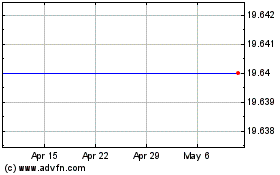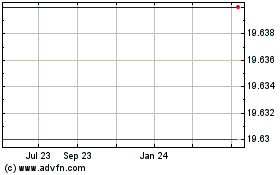By Christopher Mims
If you are among the 73% of American adults who don't log in to
Twitter at least once a month, you can be forgiven for viewing it
primarily as a place where presidential candidates launch
broadsides and celebrities embarrass themselves.
Twitter Inc.'s long struggle to define itself goes hand in hand
with its recent inability to grow beyond its active but hard to
grasp subcommunities. The mix of content, curation, humor,
self-promotion and invective confounds its product teams, leaders
and investors.
So let's define Twitter once and for all. Twitter is a media
company that happens to be based in San Francisco, and it should be
structured, led and valued as such. Twitter is no longer a
technology-driven hypergrowth unicorn. Twitter has, in a way,
admitted as much. Last week, in a memo to Twitter staff, Chief
Executive Jack Dorsey called the service the "People's News
Network."
For investors, that means Twitter is hardly a bargain, even
after a 30% drop in the price of its shares since Oct. 5. Potential
suitor Salesforce.com Inc. said as much on Friday, when it said it
was no longer interested in acquiring Twitter, joining Walt Disney
Co. and Google parent Alphabet Inc., which also considered bids,
and passed.
The definition of a media company, says New York University
journalism professor Jay Rosen, is one that "makes the stuff that
draws the attention." Today, Mr. Rosen categorizes Twitter as more
of an "editorial" company, which aggregates attention and sells its
judgments about content.
But Twitter increasingly is the place where content is born.
Millions of people "work" for Twitter by creating content that
could dominate the next day's news cycle. Twitter also curates and
amplifies this content, prompting comparisons with a social
network.
Republican presidential candidate Donald Trump uses Twitter, a
powerful broadcast medium, as a primary means of creating and
distributing his message.
Twitter also is licensing a growing stream of content, from
Wimbledon and the NBA to the NFL and the presidential debates.
Thursday, it announced a deal with BuzzFeed Inc. to stream
election-night coverage on Nov. 8. With these moves, it begins to
resemble companies such as Disney, Verizon Communications Inc. or
Netflix Inc.
But Twitter's core of monthly active users has been largely flat
for the past 15 months, growing to 313 million in the second
quarter, from 302 million in the first quarter of 2015. During the
same period, Facebook added 271 million users, almost as many as
Twitter's total, to 1.71 billion.
Revenue is still growing -- up 20% in the most recent quarter
from a year earlier. But that is the slowest growth rate since
Twitter went public in 2013. With user numbers stagnating,
Twitter's best hope is to generate additional revenue from each
user, with more and better ad products.
For now, though, Twitter remains unprofitable, mostly because of
the outsize stock grants it gives to employees, in part to keep
them from bolting for greener pastures. During the past 12 months,
the value of those grants amounted to 26% of Twitter's revenue --
second-highest among technology companies with more than $1 billion
in annual revenue, behind only Palo Alto Networks Inc.
Employee compensation gets to the heart of Twitter's problem.
Big stock grants are common in Silicon Valley, where there is
furious competition for top talent that can create breakthrough
products. But this kind of behavior makes less sense for media
companies, where much of the talent is -- and I say this knowing
I'll someday eat these words -- more interchangeable.
Most investors already view Twitter as something of a hybrid
between a media company and a tech company. Without profits,
Twitter can't be compared with others based on a price-to-earnings
ratio.
After Friday's stock drop, it is valued at roughly 4.3 times its
revenue in the past 12 months. Among media companies, Disney's
price-to-revenue ratio is 2.6, Comcast Corp.'s is 2.1, New York
Times Co.'s is 1.2 and News Corp, publisher of The Wall Street
Journal, is just under 1. Tech companies tend to be valued more
highly: Alphabet's price-to-revenue ratio is 6.7, and Facebook
Inc.'s 16.7.
If investors come to view Twitter purely as a media company, its
stock price could be cut in half. A Twitter spokeswoman didn't
respond to requests for comment.
To be fair to Twitter, about 10% of its revenue isn't from
advertising, but from sales of data derived from all those tweets.
This, it has been reported, is one reason Salesforce Chief
Executive Marc Benioff was interested in the company. But surely a
better fit, once Twitter's market cap looks more like that of a
media company, would be a company like Disney or Verizon, which
owns AOL and has agreed to buy the core assets of Yahoo Inc.
AOL and Yahoo also make interesting comparisons for Twitter. At
some point, each ceased to meaningfully innovate and became, for
the most part, a content business.
Write to Christopher Mims at christopher.mims@wsj.com
(END) Dow Jones Newswires
October 16, 2016 14:45 ET (18:45 GMT)
Copyright (c) 2016 Dow Jones & Company, Inc.
Altaba (NASDAQ:AABA)
Historical Stock Chart
From Mar 2024 to Apr 2024

Altaba (NASDAQ:AABA)
Historical Stock Chart
From Apr 2023 to Apr 2024
